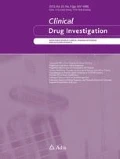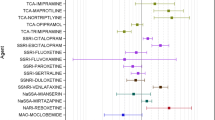Abstract
Background
Depression and coronary artery disease (CAD) are leading causes of death and disability and commonly co-occur. Different antidepressant classes have similar efficacy for depressed patients with CAD, but cardiovascular implications are unclear. Selective serotonin reuptake inhibitors (SSRIs) and mirtazapine are first-line options for depressed patients with CAD. SSRIs, but not mirtazapine, have known antiplatelet effects. Whether this affects risk of bleeding and major adverse cardiac events (MACE) in patients requiring dual antiplatelet therapy (DAPT) after percutaneous coronary intervention (PCI) is unknown.
Objective
The aim of this analysis is to examine the impact of SSRI treatment on the co-primary endpoints of composite MACE (death, myocardial infarction, or stroke) and composite bleeding events in patients treated with clopidogrel-based DAPT after PCI.
Methods
We conducted a retrospective study with co-primary endpoints of bleeding and MACE within 1 year of PCI. Three groups were compared: SSRI patients, mirtazapine patients, and patients on neither agent. Mirtazapine acted as a comparator to control for depression, for which diagnosis coding was inadequate. Time-to-event analyses were performed with Kaplan–Meier estimators and adjusted analyses utilized Cox proportional hazards. There were 6874 (820 SSRI, 55 mirtazapine, 5999 neither) patients included.
Results
SSRI patients had lower MACE risk than mirtazapine patients (hazard ratio [HR] 0.61, 95% confidence interval [CI] 0.38–0.97, p = 0.036) but higher MACE risk than patients on neither agent (HR 1.21, 95% CI 1.02–1.43, p = 0.030) in adjusted analyses. No significant differences were associated with bleeding risk (SSRI vs. neither adjusted HR 1.07, 95% CI 0.93–1.24, p = 0.36).
Conclusion
SSRI use was associated with a significant decrease in MACE rates compared with patients receiving mirtazapine. Bleeding risk was not affected by either antidepressant treatment. SSRIs may have cardioprotective benefits compared with mirtazapine.




Similar content being viewed by others
References
Naghavi M, Wang H, Lozano R, Davis A, Liang X, Zhou M, et al. Global, regional, and national age-sex specific all-cause and cause-specific mortality for 240 causes of death, 1990–2013: a systematic analysis for the Global Burden of Disease Study 2013. Lancet. 2015;385:117–71.
Ferrari AJ, Charlson FJ, Norman RE, Patten SB, Freedman G, Murray CJ, et al. Burden of depressive disorders by country, sex, age, and year: findings from the global burden of disease study 2010. PLoS Med. 2013;10(11):e1001547.
Rudisch B, Nemeroff CB. Epidemiology of comorbid coronary artery disease and depression. Biol Psychiatry. 2003;54(3):227–40.
Levine GN, Bates ER, Blankenship JC, Bailey SR, Bittl JA, Cercek B, et al. 2015 ACC/AHA/SCAI focused update on primary percutaneous coronary intervention for patients with ST-elevation myocardial infarction: an update of the 2011 ACCF/AHA/SCAI guideline for percutaneous coronary intervention and the 2013 ACCF/AHA guideline for the management of ST-elevation myocardial infarction: a report of the American College of Cardiology/American Heart Association Task Force on Clinical Practice Guidelines and the Society for Cardiovascular Angiography and Interventions. Circulation. 2016;133:1135–47.
Fihn SD, Gardin JM, Abrams J, Berra K, Blankenship JC, Dallas AP, American College of Cardiology Foundation/American Heart Association Task Force, et al. ACCF/AHA/ACP/AATS/PCNA/SCAI/STS guideline for the diagnosis and management of patients with stable ischemic heart disease: a report of the American College of Cardiology Foundation/American Heart Association Task Force on Practice Guidelines, and the American College of Physicians, American Association for Thoracic Surgery, Preventive Cardiovascular Nurses Association, Society for Cardiovascular Angiography and Interventions, and Society of Thoracic Surgeons. Circulation. 2012;2012(126):e354–471.
Freeman MP, Markowitz JC, Rosenbaum JF, Thase ME, Trivedi MH, Schneck CD, et al.; Work Group on Major Depressive Disorder. Practice guideline for the treatment of patients with major depressive disorder. 3rd edn. Independent Review Panel Overview of Guideline Development Process. 2012;1–251. http://www.psychiatryonline.com/pracGuide/pracGuideTopic_7.aspx. Accessed 26 Jun 2018.
Glassman AH, O’Connor CM, Califf RM, Swedberg K, Schwartz P, Bigger JTJ, et al. Sertraline treatment of major depression in patients with acute MI or unstable angina. JAMA. 2002;288:701–9.
Lesperance F, Frasure-Smith N, Koszycki D, Laliberte M-A, van Zyl LT, Baker B, et al. Effects of citalopram and interpersonal psychotherapy on depression in patients with coronary artery disease: the Canadian Cardiac Randomized Evaluation of Antidepressant and Psychotherapy Efficacy (CREATE) trial. JAMA. 2007;297:367–79.
Taylor CB, Youngblood ME, Catellier D, Veith RC, Carney RM, Burg MM, et al. Effects of antidepressant medication on morbidity and mortality in depressed patients after myocardial infarction. Arch Gen Psychiatry. 2005;62:792–8.
Honig A, Kuyper AMG, Schene AH, van Melle JP, de Jonge P, Tulner DM, et al. Treatment of post-myocardial infarction depressive disorder: a randomized, placebo-controlled trial with mirtazapine. Psychosom Med. 2007;69:606–13.
Serebruany VL, O’Connor CM, Gurbel PA. Effect of selective serotonin reuptake inhibitors on platelets in patients with coronary artery disease. Am J Cardiol. 2001;87:1398–400.
Hergovich N, Aigner M, Eichler HG, Entlicher J, Drucker C, Jilma B. Paroxetine decreases platelet serotonin storage and platelet function in human beings. Clin Pharmacol Ther. 2000;68:435–42.
Hirsh-Rokach B, Spectre G, Shai E, Lotan A, Ritter A, Al-Aieshy F, et al. Differential impact of selective serotonin reuptake inhibitors on platelet response to clopidogrel: a randomized, double-blind, crossover trial. Pharmacotherapy. 2015;35:140–7.
Labos C, Dasgupta K, Nedjar H, Turecki G, Rahme E. Risk of bleeding associated with combined use of selective serotonin reuptake inhibitors and antiplatelet therapy following acute myocardial infarction. CMAJ. 2011;183:1835–43.
Mortensen JK, Larsson H, Johnsen SP, Andersen G. Post stroke use of selective serotonin reuptake inhibitors and clinical outcome among patients with ischemic stroke: a nationwide propensity score-matched follow-up study. Stroke. 2013;44:420–6.
Fiest KM, Jette N, Quan H, St Germaine-Smith C, Metcalfe A, Patten SB, et al. Systematic review and assessment of validated case definitions for depression in administrative data. BMC Psychiatry. 2014;14:289.
Anttila SA, Leinonen EV. A review of the pharmacological and clinical profile of mirtazapine. CNS Drug Rev. 2001;7:249–64.
Coons JC, Iasella CJ, Chanas T, Wang N, Williams K, Boyd A, et al. Comparative effectiveness and safety analysis of dual antiplatelet therapies within an integrated delivery system. Ann Pharmacother. 2017;51:649–55.
International classification of diseases. ninth revision, clinical modification (ICD-9-CM). Salt Lake City: Medicode; 1996.
Hayasaka Y, Purgato M, Magni LR, Ogawa Y, Takeshima N, Cipriani A, et al. Dose equivalents of antidepressants: evidence-based recommendations from randomized controlled trials. J Affect Disord. 2015;180:179–84.
Bykov K, Schneeweiss S, Donneyong MM, Dong YH, Choudhry NK, Gagne JJ. Impact of an interaction between clopidogrel and selective serotonin reuptake inhibitors. Am J Cardiol. 2017;119:651–7.
Lin OA, Karim ZA, Vemana HP, Espinosa EVP, Khasawneh FT. The antidepressant 5-HT2Areceptor antagonists pizotifen and cyproheptadine inhibit serotonin-enhanced platelet function. PLoS One. 2014;9:e87026.
Aradi D, Kirtane A, Bonello L, Gurbel PA, Tantry US, Huber K, et al. Bleeding and stent thrombosis on P2Y12-inhibitors: collaborative analysis on the role of platelet reactivity for risk stratification after percutaneous coronary intervention. Eur Heart J. 2015;36:1762–71.
Meijer WEE, Heerdink ER, Nolen WA, Herings RMC, Leufkens HGM, Egberts ACG. Association of risk of abnormal bleeding with degree of serotonin reuptake inhibition by antidepressants. Arch Intern Med. 2004;164:2367–70.
Wu CS, Chang CM, Chen CY, Wu ECH, Wu KY, Liang HY, et al. Association between antidepressants and venous thromboembolism in Taiwan. J Clin Psychopharmacol. 2013;33:31–7.
Sauer WH, Berlin JA, Kimmel SE. Effect of antidepressants and their relative affinity for the serotonin transporter on the risk of myocardial infarction. Circulation. 2003;108:32–6.
Acharya T, Acharya S, Tringali S, Huang J. Association of antidepressant and atypical antipsychotic use with cardiovascular events and mortality in a veteran population. Pharmacotherapy. 2013;33:1053–61.
McCollum M, Stringer KA, Wittkowsky AK, Young S, Spinler SA. Discrepancies in identification of bleeding events after percutaneous coronary intervention. Pharmacotherapy. 2007;27:36–40.
Author information
Authors and Affiliations
Corresponding author
Ethics declarations
Funding
This work was supported by the American Heart Association Grant Number 17MCPRP33400175.
Conflict of interest
Carlo J. Iasella, Madeline S. Kreider, Lin Huang, James C. Coons, and James M. Stevenson declare no potential conflicts of interest with respect to the research, authorship, and/or publication of the article.
Ethical approval
The study was approved by the University of Pittsburgh institutional review board with exemption from informed consent prior to commencement.
Rights and permissions
About this article
Cite this article
Iasella, C.J., Kreider, M.S., Huang, L. et al. Effect of Selective Serotonin Reuptake Inhibitors on Cardiovascular Outcomes After Percutaneous Coronary Intervention: A Retrospective Cohort Study. Clin Drug Investig 39, 543–551 (2019). https://doi.org/10.1007/s40261-019-00776-7
Published:
Issue Date:
DOI: https://doi.org/10.1007/s40261-019-00776-7




